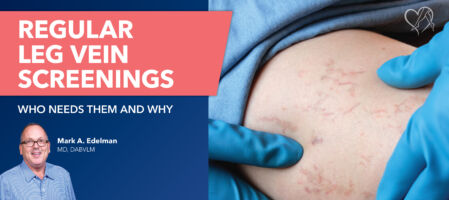
Medically reviewed by Mark A. Edelman, MD, DABVLM, on November 1, 2024
Do you often experience leg pain, heaviness, aching, or notice unsightly varicose veins and spider veins? These could be signs of underlying vein problems that shouldn't be ignored. Regular venous screenings are essential for diagnosing vein disease early and exploring effective vein treatment options. Center for Vein Restoration(CVR) is committed to providing state-of-the-art vein care to help you lead a healthier, more comfortable life.
In this blog, medically reviewed by Dr. Mark Edelman, lead physician at CVR locations in Norwalk, CT, Stamford, CT, and Scarsdale, CT, you’ll learn why vein health is a vital (yet often overlooked!) component of our overall well-being and how, without healthy veins, our circulatory system can't function optimally, leading to a host of potential health issues.
Venous insufficiency (also known as vein disease) is a condition where the veins struggle to send blood back to the heart. According to the Cleveland Clinic, this happens when vein walls and valves become weak or damaged, causing blood to pool in the legs. Symptoms can range from mild discomfort to severe leg pain, swelling, and skin changes.
The stages of vein disease include:
Individuals with a Family History of Vein Disease
Genetics plays a significant role in vein issues. If your parents or siblings have suffered from varicose veins or other vein diseases, you're at a higher risk. Family history is a strong risk factor for venous insufficiency.
People with Prolonged Standing or Sitting Jobs
Jobs that require long periods of standing or sitting can exacerbate vein problems. The National Library of Medicine (NIH) notes that occupations that provide prolonged standing, such as teaching, nursing, or office work, can increase the risk of varicose veins due to prolonged pressure on the veins.
Pregnant Women
Pregnancy increases blood volume, putting extra pressure on veins. Hormonal changes can also relax vein walls. Regular screenings during and after pregnancy can help manage and treat vein issues early.
Older Adults
As we age, vein valves may wear down, leading to venous insufficiency. Regular screenings are recommended for individuals over 50, especially if other risk factors are present.
Those Experiencing Symptoms
If you have symptoms like leg pain, swelling, heaviness, or visible varicose veins and spider veins, it's time to consult a vein specialist. Early detection through screenings can prevent complications like ulcers or deep vein thrombosis.
Early Detection Leads to Better Outcomes
Detecting vein problems early allows for more effective vein treatment options. Early intervention can significantly improve quality of life and reduce symptoms.
Prevent Serious Complications
Untreated venous insufficiency can lead to severe complications, such as skin ulcers, infections, and deep vein thrombosis (DVT) blood clots. Regular screenings help monitor vein health and take timely action.
A vein doctor can provide personalized advice on lifestyle changes and outpatient vein treatment options. Whether it's compression therapy, medication, or minimally invasive procedures, a tailored plan ensures the best outcomes.
Vein Treatment Options
Modern medicine offers a variety of vein treatment options that are minimally invasive and highly effective. Outpatient vein treatment options include:
Sclerotherapy
This involves injecting a solution into the problem veins, causing them to collapse and fade. It's particularly effective for spider veins and small varicose veins.
Endovenous Laser Treatment (EVLT)
A laser fiber is inserted into the vein, emitting energy that causes the vein to close. The Journal of Vascular Surgery touts EVLT as “a novel minimally invasive treatment with advantages of safety, effectiveness, and simplicity, and it leaves no scars. Its indications can be expanded by combining EVLT with surgical strategies.”
Radiofrequency Ablation
Similar to EVLT, this technique uses radiofrequency energy to seal off problem veins. It's often used for larger varicose veins.
Ambulatory Phlebectomy
In this procedure, varicose veins are removed through tiny incisions. It's usually an outpatient procedure with minimal downtime.
When it comes to diagnosing and treating vein disease, the Center for Vein Restoration stands out as the premier choice. Here's why:
At Center for Vein Restoration (CVR), our team of dedicated healthcare professionals is here to guide you through every step—from screening to treatment. Our board-certified vein physicians improve lives in the communities we serve every day by providing state-of-the-art vascular care in a compassionate and affordable manner.
Don't let vein problems hold you back from living your best life. Schedule a screening today and take the first step toward optimal vein health!
Call 240-965-3915 to speak to a Patient Services Representative or schedule your consultation online at a CVR near you today.

While professional vein treatment is crucial, lifestyle changes can also make a significant difference.
Regular venous screenings are not just for those already experiencing vein issues; they're a proactive step in maintaining overall vascular health. Whether you have risk factors like a family history or are noticing early symptoms, consulting with a vein specialist can set you on the path to healthier legs.
Center for Vein Restoration (CVR), America's largest physician-led vein center, offers comprehensive treatment for chronic venous insufficiency. With 110+ centers in 22 states and 70+ active physicians, CVR boasts a 98 percent patient satisfaction rating. Accepting various insurances, including Aetna, Blue Cross/Blue Shield, and Medicare, CVR provides accessible, compassionate, and effective vein care.
Call 240-965-3915 to speak to a Patient Services Representative or schedule your consultation online at a CVR near you.
